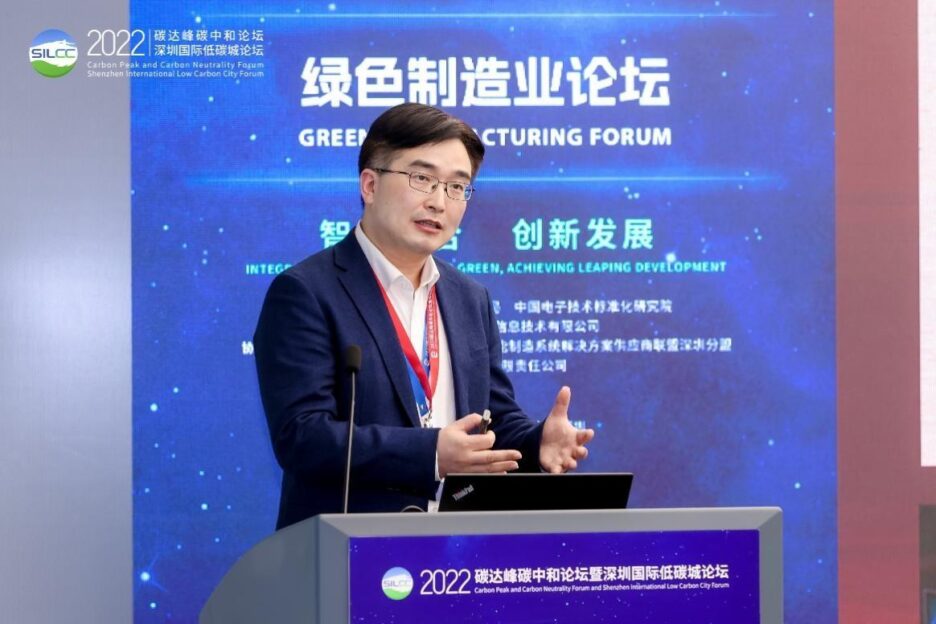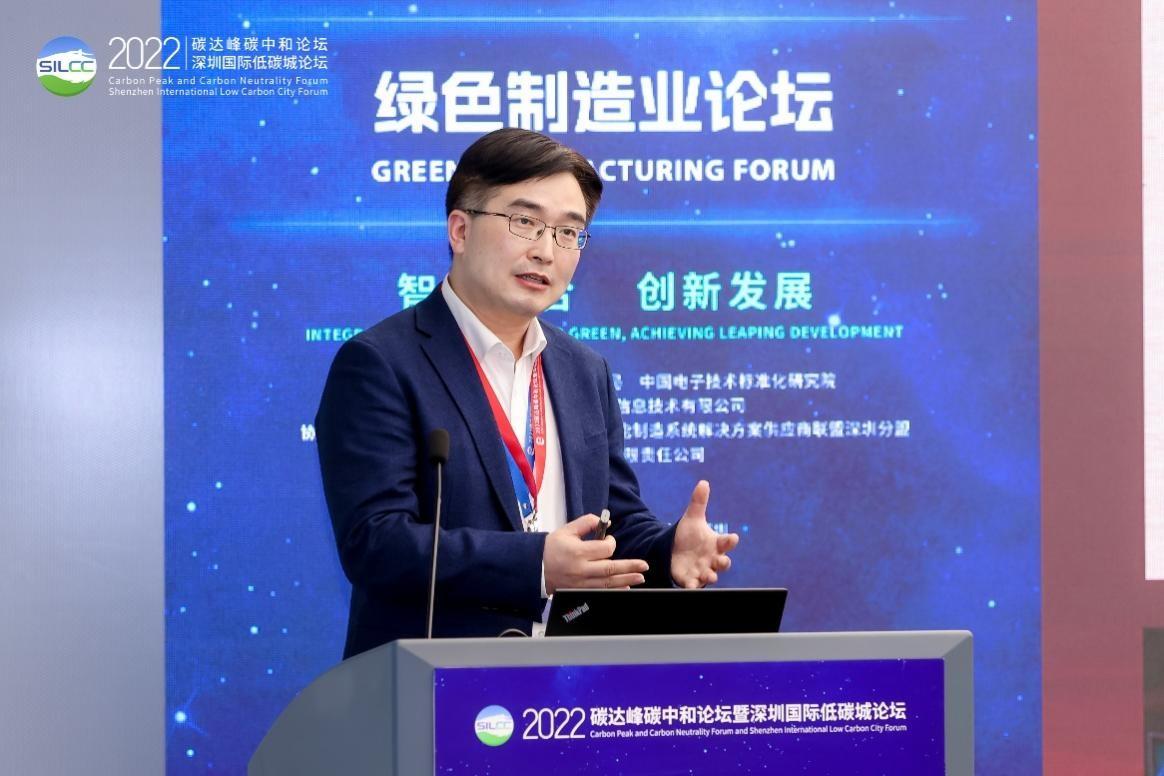High-quality development is the primary task of building a modern socialist country in an all-round way. Promoting green and low-carbon economic and social development is the key link to achieve high-quality development. How can China’s traditional factories with huge manufacturing volume develop and steadily move towards the goal of carbon neutrality? Recently, Lenovo Group Wuhan Industrial Base became the first zero-carbon factory in China’s ICT industry to achieve carbon neutrality, and explored a traditional factory. zero-carbon upgrade path.
On December 12, at the Green Manufacturing Forum hosted by China Electronics Standardization Institute and Shenzhen Bureau of Industry and Information Technology, Liu Keyan, Senior Global Manufacturing Manager of Lenovo Group, delivered a keynote speech. In his speech, he combined the experience of Lenovo’s Wuhan industrial base to explain the key breakthroughs for traditional manufacturing plants to achieve carbon neutrality. In addition, he also introduced the development path of zero-carbon manufacturing that Lenovo Group has built over the years covering design, factory, logistics, recycling, and the upstream and downstream of the supply chain, and how Lenovo Group “endogenously and externally” targets manufacturing customers Output intelligent solutions, empower many traditional industries to promote zero-carbon transformation, and help the realization of the country’s “30·60” dual-carbon goals.
Jumping out of the “four walls” of traditional factories and realizing the leapfrog development of zero-carbon factories
Lenovo Wuhan Industrial Base is Lenovo Group’s largest smart mobile device manufacturing base in the world, and it is also the first enterprise in Wuhan’s electronic information manufacturing field whose annual output value exceeds 50 billion yuan. Lenovo Group was able to take the lead in achieving zero-carbon upgrades in its Wuhan industrial base, first of all thanks to its deep insight into the trend of zero-carbon transformation.
In his speech, Liu Keyan said that breaking the inherent cognition of the concept of the factory is the key to achieving a breakthrough, from a factory with production lines, workers, and workshops within the four walls to covering office buildings, warehouses, restaurants and other supporting facilities The park is a more comprehensive factory concept. “After years of development, Chinese manufacturing has changed from a traditional factory centered on resources and labor to a green factory that emphasizes energy conservation, harmlessness, and intelligence, and is gradually moving towards a zero-carbon factory with zero comprehensive carbon emissions. “
After clarifying this conceptual breakthrough, Liu Keyan further revealed the practical path from traditional factories to zero-carbon factories, providing a demonstration reference for the industry. First, implement zero-carbon management by formulating strategic plans, delineating scope boundaries, conducting carbon verification, formulating emission reduction plans, and carbon-neutral timetables; The use of renewable energy and resource utilization, and the systematic and orderly implementation of carbon reduction and emission reduction through information technology and collaborative technology means, and finally achieve carbon neutrality through carbon offsets. In addition, Lenovo Group also attaches great importance to the extension of the responsibility of zero-carbon factories, actively benchmarking against the highest industry standards, and strengthening green product design and green supply chain management.
Four-terminal collaboration, Lenovo Group explores the “zero-carbon way” of endogenous and externalization
Under the background of the country’s active and steady promotion of carbon peak and carbon neutrality, enterprises have become the main promoters and practitioners of the dual carbon goals. As a leader in technology manufacturing, Lenovo Group has explored a practical path to reduce carbon in its own core production and manufacturing links, coordinate carbon reduction in the supply chain, and then empower industry partners for low-carbon development. In his speech, Liu Keyan further summarized Lenovo Group’s zero-carbon manufacturing experience from the design side, factory side, logistics side, and recycling side.
From the design end to the factory end, Lenovo Group’s zero-carbon practice is at the forefront of the industry. In April of this year, Lenovo Group was the first in the industry to launch a zero-carbon service, which certified the carbon footprint of the product ThinkPad X1 and ThinkPad X13 in the entire life cycle of the carbon footprint, creating a truly zero-carbon product. Today, Lenovo Group is the first to achieve carbon neutrality in its Wuhan industrial base. During this process, Lenovo Wuhan Industrial Base is working on both the energy supply side and the energy consumption side. On the one hand, it increases the supply of new energy through the construction of distributed photovoltaic power stations, reducing greenhouse gas emissions by about 2,094 tons per year; on the other hand, through cost controllable, Energy-saving upgrades for infrastructure equipment in the park have been carried out with effective technical means. With the construction of high-efficiency LED lighting systems, EC electronic reversing motor exhaust fans, and APSA cryogenic nitrogen systems, greenhouse gas emissions can be reduced by 5,790 tons per year, and with the construction of energy monitoring systems and building automation systems and other digital means to achieve energy saving and efficiency enhancement.
On the logistics side and recycling side, Lenovo Group actively promotes various types of new energy vehicles, promotes fuel-electric conversion, responds to the “road-to-rail” policy, reduces greenhouse gas emissions in logistics transportation, and uses recyclable packing belts, green and environmentally friendly Pallets, the implementation of paperless office and other measures to reduce emissions in storage areas. In addition, Lenovo Group has used its asset recovery capabilities to recycle waste assets and dispose of them in an environmentally friendly manner. Since 2005, it has disposed of more than 320,000 tons of computer equipment.
In addition to its own emission reduction practices, Lenovo Group radiates its own carbon reduction experience to the outside world through green supply chain management and industrial empowerment. In the upstream and downstream of the supply chain, Lenovo Group exerts its main power to track suppliers according to more than 30 green and low-carbon development indicators including greenhouse gas emission reduction and waste emission reduction targets. Up to now, more than 95% of suppliers have obtained quality, environment and occupational health and safety certification, and 92% of suppliers have set public carbon reduction targets under encouragement and guidance. In terms of industry empowerment, Lenovo Group actively promotes its own green technology to the outside world, including industrial energy-saving technology transformation represented by low-temperature solder paste (LTS), as well as low-carbon technology represented by warm water cooling technology and full life cycle green evaluation. Smart solutions. In addition, in terms of mechanism and ecology, Lenovo Group is also actively participating in the formulation of standards, helping to build industry databases and alliances, and helping the industry’s zero-carbon transformation.
(Source: New Vision)


